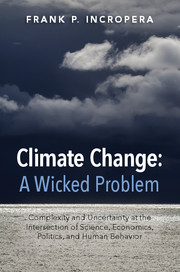 Climate Change: A Wicked Problem
Climate Change: A Wicked Problem Book contents
- Frontmatter
- Dedication
- Contents
- Foreword by Anthony F. Earley Jr.
- Foreword by G.P. “Bud” Peterson
- Foreword by Arun Majumdar
- Preface
- Acknowledgments
- Abbreviations
- 1 Energy, economics, and climate change
- 2 The Earth's climate system
- 3 Greenhouse gases
- 4 Global warming
- 5 Consequences of global warming
- 6 Mitigation, adaptation, and geoengineering
- 7 Public policy options
- 8 The politics of global warming: a history lesson and future prospects
- 9 Dissenting opinions: the great hoax
- 10 The ethics of climate change
- 11 A way forward
- Appendix A Units and conversion factors
- Appendix B Fossil fuels
- Appendix C Anthropogenic sources of natural gas and methane
- Appendix D Environmental time scales and inertia
- Appendix E Coal-fired power plants: operating conditions and costs of carbon capture and sequestration
- Notes
- References
- Index
- Plate section
Foreword by Anthony F. Earley Jr.
Published online by Cambridge University Press: 05 October 2015
- Frontmatter
- Dedication
- Contents
- Foreword by Anthony F. Earley Jr.
- Foreword by G.P. “Bud” Peterson
- Foreword by Arun Majumdar
- Preface
- Acknowledgments
- Abbreviations
- 1 Energy, economics, and climate change
- 2 The Earth's climate system
- 3 Greenhouse gases
- 4 Global warming
- 5 Consequences of global warming
- 6 Mitigation, adaptation, and geoengineering
- 7 Public policy options
- 8 The politics of global warming: a history lesson and future prospects
- 9 Dissenting opinions: the great hoax
- 10 The ethics of climate change
- 11 A way forward
- Appendix A Units and conversion factors
- Appendix B Fossil fuels
- Appendix C Anthropogenic sources of natural gas and methane
- Appendix D Environmental time scales and inertia
- Appendix E Coal-fired power plants: operating conditions and costs of carbon capture and sequestration
- Notes
- References
- Index
- Plate section
Summary
Frank Incropera has done a masterful job of making the case for taking action now to reduce the impact of greenhouse gases attributable to human activity. He does it in a way that even the most ardent skeptics will have to acknowledge is a persuasive and balanced case that respects counterarguments but engages them thoroughly and convincingly.
I have had the pleasure of knowing Dr. Incropera for almost twenty years. I first met him when he agreed to leave Purdue University and move north to take the helm as Dean of the College of Engineering at the University of Notre Dame. As a member of the Advisory Council of the College, I watched as Dr. Incropera put in place the building blocks of a great engineering school. And while many of those building blocks – nanotechnology, bioengineering, advanced control systems, supersonic wind tunnels, and the like – were beyond the ken of this nuclear submarine engineer, I was delighted to discover that the dean and I shared a passion for all facets of the production and use of energy for the benefit of society.
Over the years, I and several other members of the Advisory Council were asked to speak to his classes about the practical aspects of the energy system in America and around the world. You see, Dr. Incropera is more than just a superb engineer. As is amply demonstrated in his book, he has a gift for taking the most complex of technical subjects and making them understandable to casual readers. As one who almost flunked quantum mechanics, I can attest that this is a real gift. Beyond the technical, Dr. Incropera is always interested in the whole range of considerations for any complex energy system. Obviously, a sustainable system must be founded on good science. That is just the starting point. Economics, the environment, history, politics, tax policy, and socioeconomic issues all have roles to play in understanding why we have the energy mix we have today. More importantly, he believes that unless you clearly understand the role each of these dimensions plays, it will be impossible to craft a solution to this “wicked problem.”
- Type
- Chapter
- Information
- Climate Change: A Wicked ProblemComplexity and Uncertainty at the Intersection of Science, Economics, Politics, and Human Behavior, pp. xi - xivPublisher: Cambridge University PressPrint publication year: 2015


